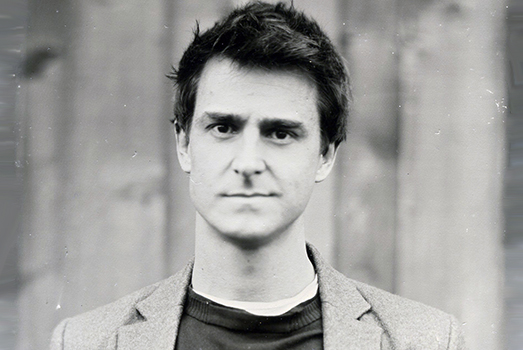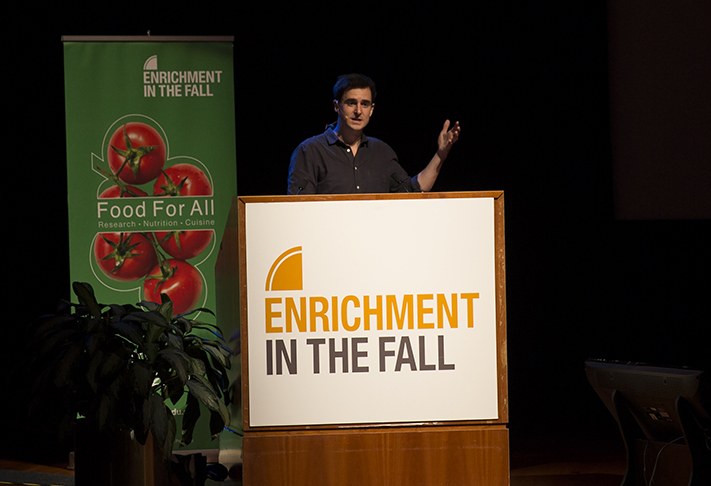Rebooting civilization

Lewis Dartnell, professor of science communication at the University of Westminster, spoke at an Enrichment in the Fall lecture about how to "reboot" the world in an apocalyptic scenario. Photo courtesy of Lewis Dartnell.
Do you have the knowledge it takes to survive the apocalypse? This was the question asked by Lewis Dartnell, professor of science communication from the University of Westminster (U.K.), at an Enrichment in the Fall lecture on campus on October 17.
Dartnell, an accomplished astrobiologist who researches the possibilities of microbial life on other planets, is also a skilled science communicator. His three books on scientific subjects include "The Knowledge: How to Rebuild our World from Scratch," which examines the same question and provides a “quickstart guide for rebooting civilization,” Dartnell said.
In his lecture, he outlined the “grand thought experiment” presented in "The Knowledge," which examines the “behind-the-scenes fundamentals of how our world works and what drove the progression of civilization over the centuries. What are the fundamentals of where our food comes from? Why do we eat what we do—why did our ancestors 10,000 years ago choose to cultivate the crops they did out of the thousands of natural plant species, and how could you restart all of that if you ever had to?” he asked.
Outlining a “grace period,” during which a survivor of the apocalypse would only need to worry about basic survival, Dartnell explained that you could use the basic contents of a handbag, such as gum, a bottle of water, hairspray and tissues, in “strange and ingenious ways in combination with each other to keep yourself alive.”
He also noted how, due to modern technology and food preservation, the food in a normal-sized supermarket would be able to keep one person alive for 55 years if it were rationed out and the most perishable items were consumed first. An additional 8 years could be added by consuming the supermarket’s canned cat and dog food, an option Dartnell said would have him “heading for the nearest bleach aisle” to end things then and there.

If you have access to bleach, he explained, use diluted bleach with river water to disinfect the water. An additional method touted by the World Health Organization (WHO) and the U.S. Centers for Disease Control (CDC) is to fill a plastic bottle with water and let it sit in the sun—under certain conditions, the UV radiation, thermal inactivation and photo-oxidative destruction will help to purify the water by inactivating disease-causing organisms in a process called solar disinfection (SODIS).
“Fire is absolutely critical to how we have survived as a species for thousands of years. We use fire to cook our food. We use fire to keep warm. We use fire to transform things we take out of the ground and make them into useful substances—like clay baked into bricks, for example,” Dartnell said. “We still depend on fire as much as our early human ancestors did.”
In the post-apocalyptic world, it’s possible to start a fire using many “weird and wonderful” everyday items, he explained, such as—ironically—a fire alarm. While researching his book, Dartnell removed the 9V battery from the back of the fire alarm and brushed the terminals against some steel wool, starting a roaring fire in the wool in a few seconds.
“We rely so heavily on a handful of plant species for our food,” he said. However, the human body cannot easily digest these grains unless they have been broken down first, which is where fire and water come into play.
“Humans have had to invest in solutions that enable us to eat these cereal crops, and these solutions are the water wheel and the windmill,” he explained. By harnessing the power of wind and water, humans have been able to power millstones to grind grain. Then, using an “external stomach”—an oven or a pot over a fire—we break down the grains with heat so we can consume them and absorb their nutrients.
His answer was through the making of glass. “Glass is a substance that is hard and strong but chemically unreactive, and it was the one substance that was critical for the scientific revolution to take place through the construction of lenses for microscopes and telescopes, for example,” he explained.
Dartnell visited a beach in the U.K. and produced glass on one weekend by himself using sand for silica, seaweed for soda and chalk, seashells or coral for lime.
“Without glass, you don’t get to do science and you can’t understand the natural world,” he said.
“'The Knowledge' explains everything you need to know about everything,” he said. “[It] will transform your understanding of the world—and help you prepare for it when it’s no longer here.”
By Caitlin Clark, KAUST News
Do you have the knowledge it takes to survive the apocalypse? This was the question asked by Lewis Dartnell, professor of science communication from the University of Westminster (U.K.), at an Enrichment in the Fall lecture on campus on October 17.
Dartnell, an accomplished astrobiologist who researches the possibilities of microbial life on other planets, is also a skilled science communicator. His three books on scientific subjects include "The Knowledge: How to Rebuild our World from Scratch," which examines the same question and provides a “quickstart guide for rebooting civilization,” Dartnell said.
Modern disconnect from ‘beautiful science’
“Living in the modern world, we have become disconnected from the basic processes that support our lives, as well as from the beautiful fundamentals of science that enable you to relearn things for yourself,” explained Dartnell.In his lecture, he outlined the “grand thought experiment” presented in "The Knowledge," which examines the “behind-the-scenes fundamentals of how our world works and what drove the progression of civilization over the centuries. What are the fundamentals of where our food comes from? Why do we eat what we do—why did our ancestors 10,000 years ago choose to cultivate the crops they did out of the thousands of natural plant species, and how could you restart all of that if you ever had to?” he asked.
Post-apocalypse: What would you do?
“Let’s imagine you wake up tomorrow in the post-apocalyptic scenario and have no idea where you are or what time it is,” he told the audience. “How can you go about finding out these things for yourselves without the modern conveniences of everyday life, such as calendars, electricity or navigation devices?”Outlining a “grace period,” during which a survivor of the apocalypse would only need to worry about basic survival, Dartnell explained that you could use the basic contents of a handbag, such as gum, a bottle of water, hairspray and tissues, in “strange and ingenious ways in combination with each other to keep yourself alive.”
He also noted how, due to modern technology and food preservation, the food in a normal-sized supermarket would be able to keep one person alive for 55 years if it were rationed out and the most perishable items were consumed first. An additional 8 years could be added by consuming the supermarket’s canned cat and dog food, an option Dartnell said would have him “heading for the nearest bleach aisle” to end things then and there.

Lewis Dartnell, professor of science communication at the University of Westminster and author of "The Knowledge: How to Rebuild our World from Scratch," spoke at an Enrichment in the Fall lecture on October 17 about how to "reboot" the world in an apocalyptic scenario. Photo by Ginger Lisanti.
Fire and water
“Water is a huge concern for keeping yourself alive,” Dartnell said. “How can we apply modern science technology in this situation to know for a fact the water you are about to drink is not going to kill you?”If you have access to bleach, he explained, use diluted bleach with river water to disinfect the water. An additional method touted by the World Health Organization (WHO) and the U.S. Centers for Disease Control (CDC) is to fill a plastic bottle with water and let it sit in the sun—under certain conditions, the UV radiation, thermal inactivation and photo-oxidative destruction will help to purify the water by inactivating disease-causing organisms in a process called solar disinfection (SODIS).
“Fire is absolutely critical to how we have survived as a species for thousands of years. We use fire to cook our food. We use fire to keep warm. We use fire to transform things we take out of the ground and make them into useful substances—like clay baked into bricks, for example,” Dartnell said. “We still depend on fire as much as our early human ancestors did.”
In the post-apocalyptic world, it’s possible to start a fire using many “weird and wonderful” everyday items, he explained, such as—ironically—a fire alarm. While researching his book, Dartnell removed the 9V battery from the back of the fire alarm and brushed the terminals against some steel wool, starting a roaring fire in the wool in a few seconds.
‘Why do we eat what we eat?’
In correlation with the 2016 Fall Enrichment Program’s theme of “Food for All,” Dartnell also examined the grain staples that have supported humans throughout history—wheat, rice and maize.“We rely so heavily on a handful of plant species for our food,” he said. However, the human body cannot easily digest these grains unless they have been broken down first, which is where fire and water come into play.
“Humans have had to invest in solutions that enable us to eat these cereal crops, and these solutions are the water wheel and the windmill,” he explained. By harnessing the power of wind and water, humans have been able to power millstones to grind grain. Then, using an “external stomach”—an oven or a pot over a fire—we break down the grains with heat so we can consume them and absorb their nutrients.
Advancing science in new world
Dartnell noted that, at some point, the post-apocalyptic world would begin “settling down,” with people re-establishing the normal, basic rhythms of survival. “What then?” he asked—how would people again create the scientific advances that shaped our world since the 1500s and 1600s?His answer was through the making of glass. “Glass is a substance that is hard and strong but chemically unreactive, and it was the one substance that was critical for the scientific revolution to take place through the construction of lenses for microscopes and telescopes, for example,” he explained.
Dartnell visited a beach in the U.K. and produced glass on one weekend by himself using sand for silica, seaweed for soda and chalk, seashells or coral for lime.
“Without glass, you don’t get to do science and you can’t understand the natural world,” he said.
A ‘journey of discovery’
Dartnell’s eye-opening lecture gave insight into not only the fundamentals of what make up our modern lives—and what we so easily take for granted—but also his “journey of discovery” into collating these elements, he noted.“'The Knowledge' explains everything you need to know about everything,” he said. “[It] will transform your understanding of the world—and help you prepare for it when it’s no longer here.”
By Caitlin Clark, KAUST News
Related articles
Related articles

